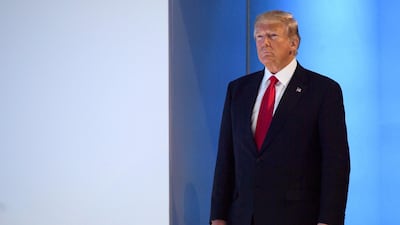Donald Trump's appearance at the World Economic Forum annual meeting in Davos, Switzerland, was simultaneously bizarre and familiar. Though born into great wealth and advantage, he casts himself as a quintessential outsider, overcoming vast obstacles to seduce and dominate existing elites – first in Manhattan, then Washington and now globally.
The forum's main topic was trade. And trade is exactly where one should begin in understanding how "America First" broadly operates in practice and what defines a distinctive Trump-inflected foreign policy that decisively breaks with previous American approaches.
Mr Trump's attitudes towards trade explain much, particularly his visceral, troubling and otherwise inexplicable hostility to multilateral agreements, arrangements and institutions.
In his view, all people, both individually and collectively, in every encounter fall into two categories: winners and losers. Even in an essentially win-win scenario, one party will almost certainly be more advantaged, thereby qualifying as the "winner". Anyone not the “winner” is, by definition, the "loser". Money is the primary metric. There are no partners, just rivals and opponents.
He thinks Washington’s prodigious economic and military power, as compared to any other individual state, is its main competitive advantage. However, he reasons, at least since the Second World War, American leaderships have stupidly forgone this advantage by pursuing multilateral, systemic and rules-based arrangements. Because these involve negotiating with groups of countries, the overwhelming asymmetry of any one-on-one match-up between Washington and another party is pointlessly squandered.
A simple example is his interpretation of the North American Free Trade Agreement (Nafta). Rather than negotiating with Canada and Mexico separately, Nafta pits Washington against what amounts to a new and much stronger opponent: Canada-Mexico.
He thinks that under Nafta, Washington foolishly consents – to its disadvantage – to confront the combined strengths of Canada and Mexico. Naturally it must accept less from both together than it could compel from each separately.
He has other concerns. Anything arranged by any of his predecessors is, by definition, "a bad deal", especially the nuclear agreement with Iran ("the worst deal ever"). Even a bilateral treaty like the US-Korea Free Trade Agreement is objectionable, despite the obvious necessity of Washington-Seoul partnership against Pyongyang, because he is sure he could have done better.
Moreover, all agreements, particularly multilateral ones, mandate US responsibilities as well as rights. Mr Trump sees this as, by definition, impinging on US sovereignty.
Because all of life, including international relations, is a war of all against all and an unceasing competition of winners and losers, he rejects the idea, embraced by all of his predecessors since the Second World War, that Washington benefits from a rules-based international order.
Dwight Eisenhower, Richard Nixon, Ronald Reagan, Bill Clinton, George W Bush and Barack Obama might have had different visions of the specifics of such an order. But, like naive hippies, they all assumed that international systems, even though they voluntarily commit Washington to certain constraints on its own behaviour, are inherently beneficial, especially when the United States is a key architect of their terms, procedures and purposes.
Mr Trump categorically rejects the dominant American internationalist consensus as the product of childish illusions. He instead insists that Washington’s power is best leveraged not by principled structures but via ad hoc, bilateral and non-systemic arrangements.
However, Mr Trump has inherited a set of policies and domestic and international institutions predicated on the very assumptions he derisively rejects. And they remain a powerful consensus in the US government he now leads.
That's why, despite his nativist attitude and statements, many of his policies and pronouncements still reflect an internationalist agenda. Just as many American institutions, including the media, the Republican Party and even the Democrats, are learning to live with him, he is adjusting to a reality in which his anti-internationalist attitudes, although popular with his base, remain highly unconventional in Washington and largely dysfunctional in international relations.
For months, he resisted publically affirming that Washington is bound by Article 5 of the Nato Treaty to come to the defence of any other member that is attacked militarily. His position was that Nato members behind in their payments couldn't necessarily expect the benefit of collective defence, which is the raison d'être of the organisation. He even removed a drafted reference to Article 5 from a May 2017 speech he delivered at Nato headquarters in Brussels. But in June, he finally acknowledged Washington's responsibilities under Article 5.
Mr Trump is operating in an American and global system largely shaped by ideas he disdains. In most ways, as he is quickly discovering, he is their captive.
Because he is president, Mr Trump and the American establishment – and now the international economic elite in Davos as well – are stuck with each other. It's not his first incongruous and unhappy marriage.
As his new tariffs on Chinese solar panels and South Korean washing machines demonstrate, when put into practice, Mr Trump’s nativist and protectionist attitude makes for policies every bit as bad as the assumptions which informs it. Simplistic and anachronistic attitudes are only likely to produce fundamentally self-defeating policies.
Nonetheless, his passionately held but profoundly mistaken attitudes towards trade are the best guide to what is emerging as a distinctive Trump approach to US foreign policy.


